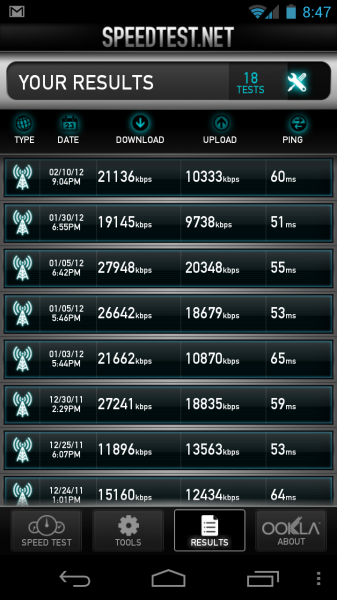2012 is LTE's 'breakout' year
 While the buzzword in mobile in 2011 was LTE, consumers by and large did not respond to the hype. Only 6.8 million LTE devices sold worldwide -- a small drop in the bucket of annual phone sales. Strategy Analytics says that's about to change in a big way.
While the buzzword in mobile in 2011 was LTE, consumers by and large did not respond to the hype. Only 6.8 million LTE devices sold worldwide -- a small drop in the bucket of annual phone sales. Strategy Analytics says that's about to change in a big way.
The firm predicts shipments will increase by a factor of ten to 67 million units in 2012. The firm expects markets in the United States, Japan and South Korea to spearhead this growth, with a broader range of devices from manufacturers including Apple, Samsung, HTC, LG, Nokia, Motorola, Pantech and Fujitsu giving consumers more options.
Apple is expected to include LTE in the next iPhone following the inclusion of 4G in the new iPad. iPhone is the top-selling phone model worldwide, and LTE compatibility will contribute a significant portion of the standard's growth in 2012. Why is Apple finally biting the bullet and joining the ranks of its competitors? It's all about adoption.
"Multiple operators and multiple phone vendors will be launching dozens of LTE models across numerous countries worldwide", Strategy Analytics Executive Director Neil Mawston argues. "LTE has quickly become a high-growth, high-value market that no operator, service developer, device vendor or component maker can afford to ignore".
In 2011, LTE deployment was limited to a few carriers worldwide. Here in the states, Verizon Wireless was the only carrier to have a network of any consequence, although AT&T started their rollout later in the year. In 2012, things are much different: AT&T will continue to build out its network, and Sprint is expected to join the fray.
T-Mobile is a bit behind, with a rollout expected in 2013, however it's not out of the question we'll see LTE-capable devices early. In any case, the marked increase in coverage will in turn spur manufacturers to release more LTE-capable phones, increasing overall sales.
There are a few factors that will work against LTE adoption during the year, Mawston says. One of these is cost: both plans and phones will remain relatively expensive. Another is a number of kinks surrounding the technology that have yet to be rectified. "Consumers will be concerned about LTE usability issues, such as shortened battery life, excessive device weight, or sudden bill shock caused by high data consumption", he explains.
Even with a ten fold increase in sales, overall LTE phones will still be a small fraction of total phone sales worldwide: in 2011, Gartner says some 1.77 billion phones were sold.
